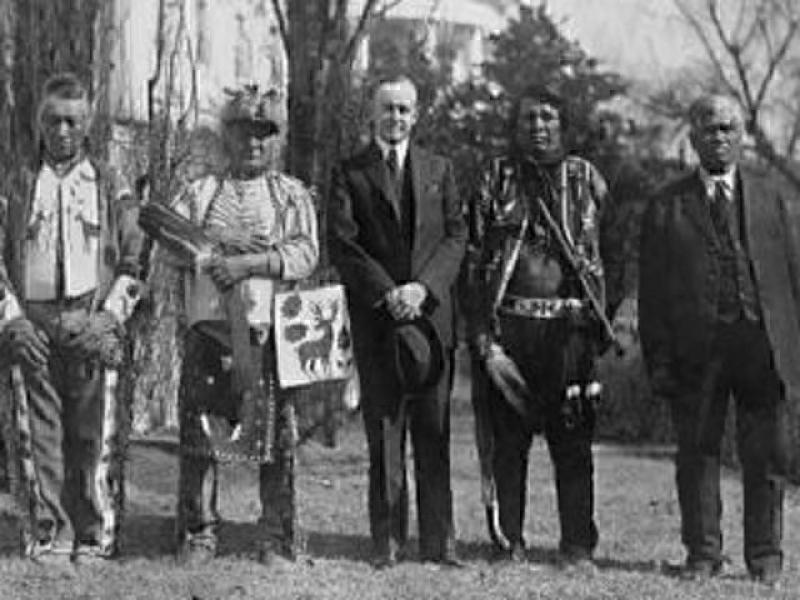On this day, all Indians made United States citizens


On June 2, 1924, President Calvin Coolidge signed into law the Indian Citizenship Act, which marked the end of a long debate and struggle, at a federal level, over full birthright citizenship for American Indians.
The act read that “all noncitizen Indians born within the territorial limits of the United States be, and they are hereby, declared to be citizens of the United States: Provided that the granting of such citizenship shall not in any manner impair or otherwise affect the right of any Indian to tribal or other property.”
Link : Read the Act
American Indians had occupied a unique place since the drafting of the Constitution in citizenship matters. Originally, the Constitution’s Article I said that “Indians not taxed” couldn’t be counted in the voting population of states (while slaves were counted as three-fifths of a person).
American Indians were also part of the Dred Scott decision in 1857 but in a much different way. Chief Justice Roger Taney argued that American Indians, unlike enslaved blacks, could become citizens, under congressional and legal supervision.
The 14th amendment’s ratification in July 1868 overturned Dred Scott and made all persons born or naturalized in the United States citizens, with equal protection and due process under the law. But for American Indians, interpretations of the amendment immediately excluded most of them from citizenship.
There was enough confusion after the 14th amendment was ratified about American Indian citizenship that in 1870, the Senate Judiciary committee was asked to clarify the issue.
The committee said it was clear that “the 14th amendment to the Constitution has no effect whatever upon the status of the Indian tribes within the limits of the United States,” but that “straggling Indians” were subject to the jurisdiction of the United States.
At the time, U.S. Census figures showed that just 8 percent of American Indians were classified as “taxed” and eligible to become citizens. The estimated American Indian population in the 1870 census was larger than the population of five states and 10 territories—with 92 percent of those American Indians ineligible to be citizens.
The Dawes Act in 1887 gave American citizenship to all Native Americans who accepted individual land grants under the provisions of statutes and treaties, and it marked another period where the government aggressively sought to allow other parties to acquire American Indian lands.
The issue of American Indian birthright citizenship wouldn’t be settled until 1924 when the Indian Citizenship Act conferred citizenship on all American Indians. At the time, 125,000 of an estimated population of 300,000 American Indians weren’t citizens.
The Indian Citizenship Act still didn’t offer full protection of voting rights to Indians. As late as 1948, two states (Arizona and New Mexico) had laws that barred many American Indians from voting, and American Indians faced some of the same barriers as blacks, until the passage of the Civil Rights Act of 1965, including Jim Crow-like tactics and poll taxes.
Tags
Who is online
38 visitors

Native Americans were only able to win the right to vote by fighting for it state by state. The last state to fully guarantee voting rights for Native people was Utah in 1962. Despite these victories, Native people were still prevented from voting with poll taxes, literacy tests and intimidation—the same tactics used against black voters.
Interesting how so many people don't know this, but, Native Americans are STILL not covered under the U.S. Constitution. We are "covered" under the Commerce Clause where Congress has taken the stance that they and they alone control Native Americans, and have passed 276 laws/regulations to ensure Native Americans are not/will not be free people (CFR: Title 25. Indians) regardless of our citizenship.
And it is still being used today. SD and MT for starters.
I well remember talking to my grandfather about it. He was born around 1880 and was part of the Pillager Band that fought against the US 3rd Infantry at Sugar Point, Leech Lake MN. 1898. Anyhow his take on citizenship was interesting, to say the least.
Yeah, finally made citizens in a country that did it's best to annihilate us.
Forgive me if I'm not celebrating.
I don't blame you. But I hope it's ok to say I'm happy you are here. How else can others learn without the blessing of history being handed down, generation to generation.
Thank you Sister.
Rather ironic that the first peoples to inhabit the land were 'granted' citizenship by those who sought to annihilate them.
That went though my head as well - in fact I would have thought the "newcomers" should have had to obtain permanent visas from the Indians in order to remain in North America.
Well Buzz, as you know, we had pizz poor immigration laws.